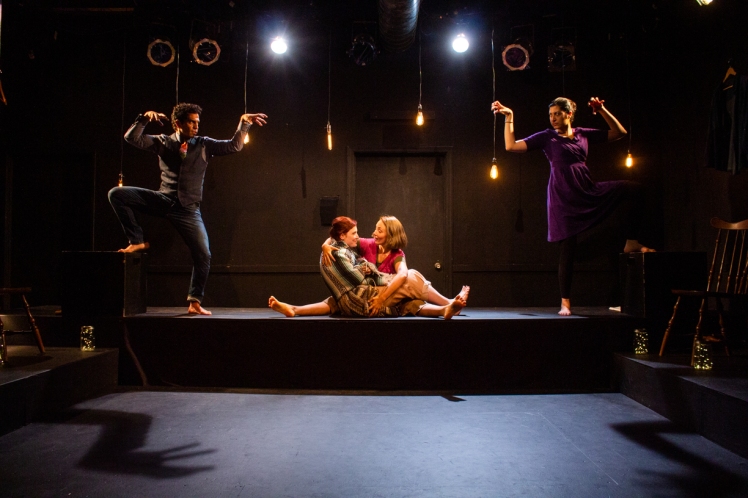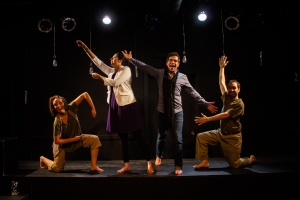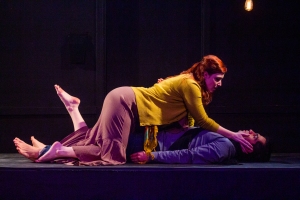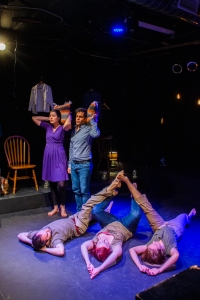
In How We’re Different From Animals, a world premiere play based on short stories by Miranda July, there is one common theme—romance. Romance is, after all, how July argues we are different from animals. For example, humans are the only animal that kiss. Presented by Elan Ensemble in their inaugural production at the Atwater Village Theatre, this creative, contemplative piece makes the most of innovative movement and staging, telling four different short stories exploring the various forms romance can take, and the effect the inherently romantic nature of human beings has on us all.

Elan Ensemble is a movement-based company that aims to tell stories using a physical approach. Directed by Jonathan Muñoz-Proulx, every individual movement the five-person ensemble makes is impeccably thought-out. Each of the four stories used in the piece is told primarily by a different member of the ensemble, with the others acting out the supporting roles in the story. Costumes hang on hangers around the edges of the set, enabling the actors to seamlessly transition between roles, never leaving the stage and constantly morphing from one character to another. All of the stories are about love and human connection, and all of July’s protagonists are quirky and, as so many humans often are, lonely in one way or another.

The first story, told by Danielle Reynolds, is the strongest and most memorable of the four. It follows a woman who develops an intense attachment to the daughter of a man who is her longtime friend and one-time love interest, and the unconventional relationship she comes to have with their entire family. The story spans nearly two decades, from the birth of the young girl, whose name is Lion (Tarah Pollock), to her early college years. During this time the narrator experiences very high highs and very low lows in her relationships with Lion and her parents, leading to an unexpected and emotional conclusion. The design elements in this play are strong, and shine brightest in this piece. From the sound design (John Zalewski) as Lion splashes around in a pool to the lighting design (Karyn D. Lawrence) when she plays make believe, the world created is an immersive and detailed one that looks beautiful in the small space.

Elmira Rahim tells the second story, an affecting tale of a couple struggling to find the passion that has slowly left their relationship. One day, they sign up to be background extras on a film shoot, and ironically, the staged interaction they are forced to have ends up being the most genuine moment of connection they have had in years. This story is also one of the most memorable, thanks to Rahim’s effective, emotional storytelling and the excellent physicality in the climactic scenes, where she watches other actors play her husband and herself as they mime eating dinner on set.
The latter two stories are a bit harder to connect with emotionally, but continue the theme of exploring different and unexpected types of love. First, Adam Lebowitz-Lockard narrates a tale of a man who becomes infatuated with his friend’s sister, whom he has never met, and whom may or may not actually exist. In the final story, Pollock plays a woman who develops a borderline obsession with her neighbor, an epileptic, married man she has a memorable encounter with one day at the pool. In all four stories, Julián Juaquín stars as the object of affection, always just out of reach for the person infatuated with him, or with the idea of him. Since the first two stories are the most effective and fully realized, it would be interesting to see the effect reordering them may have on the piece as a whole. But as it stands the momentum still builds fairly nicely, thanks in large part to the nimble cast being in near-constant motion, painting a truly multi-dimensional picture that is both moving and stunning to watch.
How We’re Different From Animals runs at the Atwater Village Theatre through March 24th. The running time is 85 minutes, no intermission. Performances are Fridays and Saturdays at 8pm and Sundays at 3pm. Tickets are $25 and can be purchased here.
One thought on “Theater Review: Elan Ensemble’s How We’re Different From Animals”